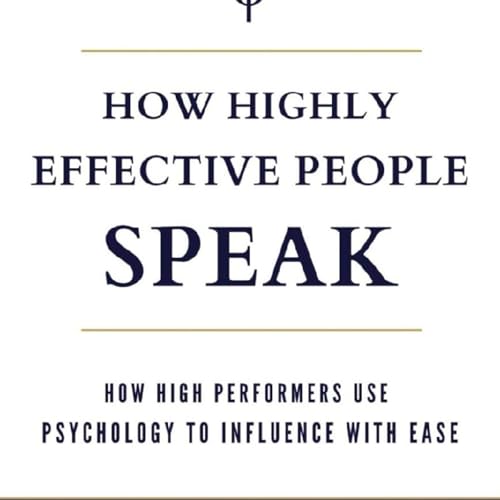Book by Peter D. Andrei talks about how people should speak to influence How high performance use psychology to influence with talks about communication is the key, speak with purpose, adapt your audience emotional priming, cognitive ease, authority and crediablity, precision and clarity, conversational framing, powerfull opening and closing, rule of three, build arguments like a story , tone and pace, body language, over explaining , talking without listening, focus on self not listener, deliberate practice, mindset of influence Summary of How Highly Effective Performers Achieve High Performance With Ease By Peter Andrea Core Concept * Communication as Influence * The most effective communication doesn't speak to inform - they speak to influence. * Influence is the ability to change how people think, feel, or what they believe. * Mastering communication transforms you into becoming a high performer. Foundational Principles of Effective Speech * Speak With Purpose * Every communication must have a clear goal: To persuade. * If you don't know what to do. * Define what you want your audience to think, feel or do before you speak. * Adapt to Your Audience * Know your audience: tailor their message to your audience's values, priorities, and frames of reference. * Use language your audience understands and relates to. Psychological Levers of Influence * Emotional Priming * Emotions drive decisions more than logic. * Use storytelling, imagery, and metaphors, emotive language to prime your listener's emotions. * Cognitive Ease * Messages that are easier to process are more believable. * Use simple language, rhythm, and clear, organized structures to make ideas "feel right." * Authority and Credibility * Establish trust quickly through expertise, confidence, clear structure, and demonstrating certainty. * Speak with clarity, not hesitation or vague language. Use specific, not general. Tactical Language Strategies * Precision and Clarity * Structure your sentences clearly. * Deliver information step by step. * Conversational Framing * Frame your message for benefits to the listener. * Address potential concerns, objections. * Powerful Openings and Closings * Start with something impactful, emotionally or intellectually engaging. * End with a clear, impactful call to action or a memorable point and promise action. Influence Through Structure * The Rule of Three * Organize ideas into groups of three for clarity and memorability. * Example: "Here's what we need to do, why it's important, and how we'll do it." * Build Arguments Like a Story * Use a narrative flow: context -> conflict -> resolution. * Connect emotionally, intentionally, and avoid abstract ideas relatable. Nonverbal Reinforcement * Tone and Pace * Match your tone to the message - firm for authority, soothing for empathy. * Use strategic pauses to emphasize key points and give ideas time to land. * Body Language * Maintain confident eye contact, and gestures amplify your message. * Avoid fidgeting or closed-off postures that signal nervousness. Avoiding Common Communication Pitfalls * Over-Explaining * Simplicity signals clarity; over-explaining signals insecurity. * Say only what's necessary to influence a decision. * Talking Without Listening * Effective speakers are also effective listeners. * Adapt in real time based on your listener's or audience's feedback. * Focusing on Self, Not Listener * Shift from "what do I want to say?" to "what does my listener need to hear?" Developing Speaking Skills * Summary by @MindBranches * Deliberate Practice * Practice specific skills intensely: voice, pauses, persuasive closings. * Record yourself, ask for feedback, refine your delivery. * Mindset of Influence * Don't try to impress, serve to influence. * Approach communication as a service; invest in feedback and repetition. Here are the words extracted from the image, organized by their approximate location and hierarchy, to the best of my ability to interpret the mind map's structure: Summary of How Highly Effective Performers Achieve High Performance With Ease By Peter Andrea Core Concept * Communication as Influence * The most effective communication doesn't speak to inform - they speak to influence. * Influence is the ability to change how people think, feel, or what they believe. * Mastering communication transforms you into becoming a high performer. Foundational Principles of Effective Speech * Speak With Purpose * Every communication must have a clear goal: To persuade. * If you don't know what to do. * Define what you want your audience to think, feel or do before you speak. * Adapt to Your Audience * Know your audience: tailor their message to your audience's values, priorities, and frames of reference. * Use language your audience understands and relates to. Psychological Levers of Influence * Emotional Priming * Emotions drive decisions more than logic. * Use storytelling, imagery, and metaphors, emotive language to prime your listener's emotions...
Más
Menos
 Sep 27 20254 m
Sep 27 20254 m

